Whether it is Alopecia or Tinea Capitis, hair fall is characterised by excessive hair loss from the scalp. The condition is mainly experienced by young people affecting them medically and psychologically. In a natural hair growth cycle, lost hair is replaced by new hair. However, people suffering from continual hair loss can have temporary or permanent hair loss. These conditions develop over time, with considerable hair loss per day.
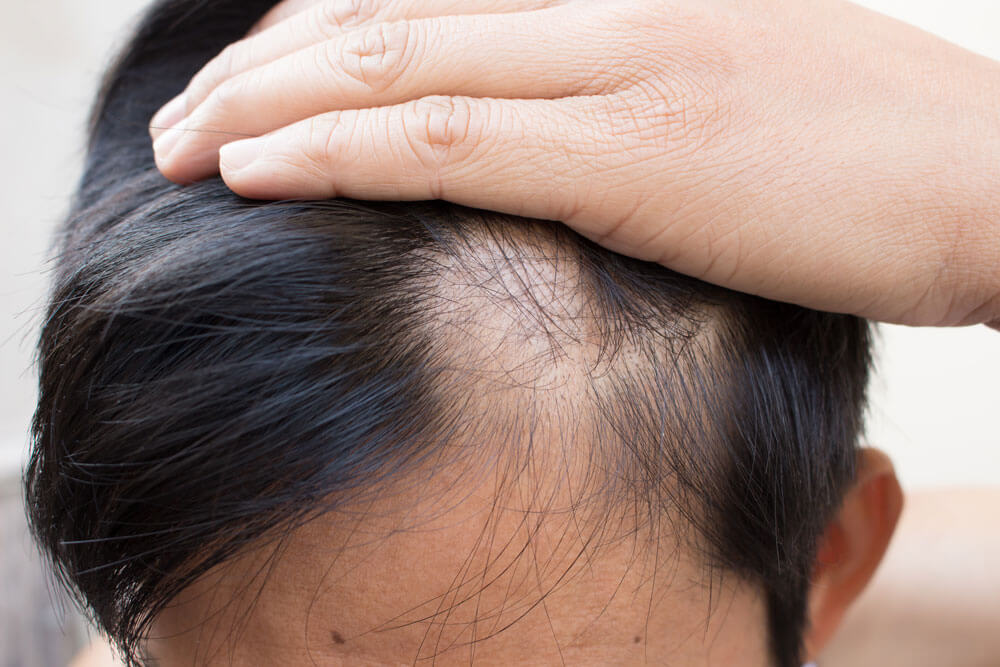
Alopecia Areata
Women experience hair thinning due to ageing, but some women experience hair loss soon after puberty with the hormonal changes. Hair begins to thin all over the scalp, but the hairline doesn’t recede. Although hair thins dramatically, it rarely leads to baldness. On the other hand, men experience hair loss more than women. It begins soon after puberty and can get worse with the ageing process. Thus, it is advisable to opt for support for hair fall as soon as you notice bald patches or excessive hair fall.
Types of hair loss and what causes it
During pregnancy and after childbirth
Many ladies suffer from temporary hair loss during pregnancy or after the delivery of their child/children. The hair loss lasts for several months. The hair follicles in the scalp enter the resting phase and do not enter the re-growth phase. As a result, women start losing hair, especially around the crown and temple.
Due to dandruff
Dandruff is one of the leading causes of hair fall in both men and women. Although it seldom causes hair to fall on its own, itching can lead to scratching, which in turn, can injure the hair follicles, leading to breakage and loss of hair.
Alopecia causes
Alopecia Areata is an autoimmune disorder in which the body’s immune system begins attacking hair follicles and other healthy tissues of the body. This disease can affect people of all genders and ages. Alocpecia symptoms are when hair starts falling in patches from scalp, beard, eyebrows, and other parts of body. If left untreated, this disease may lead to alopecia totalis or complete hair loss.
Evidence-based homoeopathy: Case report of Alopecia Areata in an 11 year old boy – 2019 by Shivadikar, Ashish in Indian journal of research in homeopathy.
Premature baldness
Premature baldness starts with hair thinning on its own and can be caused by several reasons like stress, hormonal imbalance, genetic conditions, exposing hair to excessive heat or harsh chemicals.
Trichotillomania
Trichotillomania is an abnormal behaviour where some people begin to pull their hair out from the scalp and other parts of the body and cannot seem to stop. If it continues over the years, then hair loss can become permanent. This condition is best treated through consulting a psychotherapist who can diagnose the issue, and then you can opt for homeopathic remedies to support.
Tinea Capitis
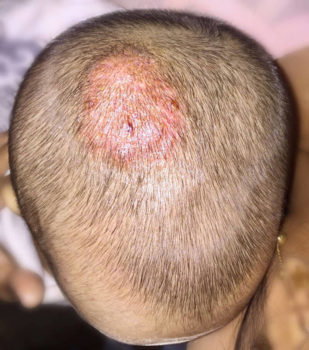
Tinea Capitis
Tinea Capitis, better known as scalp ringworm, is one of the most common causes of hair loss in children. This fungal infection leads to hair fall in patches that can lead to bald spots. The area begins to look scaly and can be itchy.
Family history (genetic)
Genetic conditions can cause hair loss with ageing as the condition has been passed down from generation to generation. You can inherit hereditary diseases from the paternal or maternal side of your family.
Hormonal disorders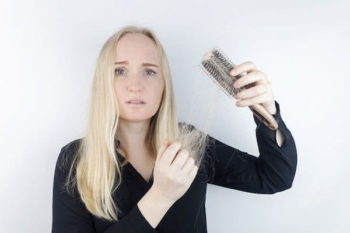
The hormonal changes due to puberty, childbirth, pregnancy, menopause, or thyroid problems can lead to hair fall. These are more common in women than men. When Progesterone and Estrogen levels begin to drop, hair becomes thinner, and hair follicles shrink, resulting in temporary or permanent hair loss.
Medications and other supplements
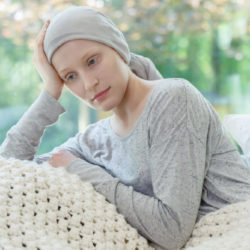 The unwanted side effects of some medicines/drugs which are usually used to treat various fungal diseases, cancer (radiation therapy), and heart problems can cause loss of hair which is primarily temporary.
The unwanted side effects of some medicines/drugs which are usually used to treat various fungal diseases, cancer (radiation therapy), and heart problems can cause loss of hair which is primarily temporary.
Effects of pre-defined Homoeopathic medicines to mitigate adverse dermatological effects of radiotherapy and vomiting of chemotherapy in breast carcinoma: A randomised, double-blind, placebo-controlled, pilot trial in the context of usual care By, Purnima Shukla; Chaturbhuja Nayak; Mirza Baig; Purak Misra
Radiotherapy and chemotherapy are used in breast cancer, but they cause an array of adverse effects including dermatological changes and vomiting. Pre-identified homoeopathic medicines appeared superior to placebo, warranting further evaluation.
Stress
A significant amount of stress or trauma can lead to hair falling. Stress can force hair follicles to enter a resting phase. As a result, no new strands of hair grow, and the existing hair will keep falling while brushing or washing.
Hair styling
The continuous pulling of hair for making hairstyles such as ponytails or buns can also damage the hair follicles. The unwelcome news is that this loss due to continuous hair pulling can be permanent.
Symptoms
- Gradual thinning on top of head This type of hair loss usually develops in men. In this condition, the hair starts becoming thin on the top of the forehead, and a broad patch develops in that region. Thinning of hair is also common among women as the age progresses, but the pattern is different from that of men.
- Circular or patchy bald spots Sometimes the hair loss is in circular or patchy form around the scalp, beard, or eyebrows. The skin in those areas tends to become itchy before hair fall. However, hair fall in these areas occurs without any rashes, redness, or scarring.
- Sudden Loosening of Hair Sometimes, stress or a sudden shock can cause the hair loss. While combing or washing, handfuls of hair tend to come out. Although this type of hair loss is temporary.
- Losing hair from the full-body This is the most extreme side of hair loss. It involves hair falling from different body regions such as eyebrows, eyelashes, chest hair etc.
Prevention and management of Hair Fall
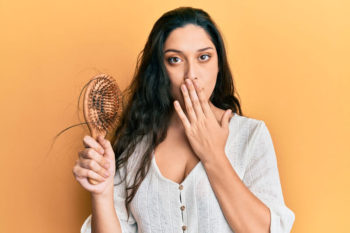 Homeopathic support
Homeopathic support
Homeopathic support can be a suitable option as it focuses on treating the symptoms of hair fall by treating its root cause. The remedies are prescribed to a client based on their individual case history and considering other factors that result in hair loss.
Although there are many homeopathic remedies available for hair problems, it is best to consult a Homeopathic Consultant to opt for best suitable remedy.
Alopecia treatment study
A Case Report of Alopecia Areata Treated with Individualized Homoeopathy – 2021 by Amit Bhasme; Preeti Lamba; & Uzma Sajjan.
This case study was conducted by Dermatological Department at Dr. D. Y. Patil Homoeopathic Medical College and Research Centre. A 42-year-old female client with Alopecia Areata was treated with individualised homoeopathic medicine (iHOM) between 2nd May 2019 and 16th January 2020. Homeopathic treatment as a complementary health practice was given for a period of 8 months and positive results from iHOM medicine were seen.
Duration of the support required
Homeopathic support usually shows improvement in a few weeks depending on the patient. The other factors that determine the duration are:
- The severity
- The extent or spread of the disease
- Duration
Book an appointment with one of our experienced homeopaths
- Hair loss and Homeopathic support - 14/04/2022



